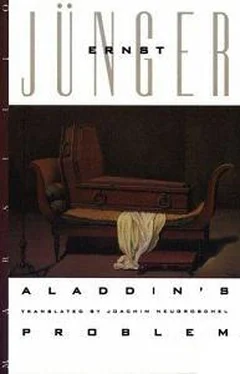All that is long past. Wars and revolutions, liquidations and expulsions separate us from that time. I gaze back at two generations of emigres, refugees, and murder victims. Today, nobody knows our name anymore. Who knows anything about the Katzbach, on whose banks we resided, and where Father Blucher gave the French a good drubbing in the pouring rain. The Katzbach now has a different name, just as I do.
When I leaf through our family history, I can imagine how I would have lived in those days: after being tutored at home, I would have either joined the cadet corps or attended the Protestant Gymnasium, the Knights' Academy. Then, no doubt, I would have reported as a cadet sergeant or as a one-year volunteer in the Liegnitz Royal Grenadiers' Regiment. That would have been followed by a military career or the university — most likely cameralistics. In those contexts, the family name was a good thing, but one could not rest on such laurels; the discipline was severe. As a rule, one could manage to hold out until the critical period in one's military career. There was also the police lieutenant, the district commander, the traveling wine salesman. Eventually one could retire to one's entailed estate. The landed properties offered a more or less comfortable livelihood.
A pronounced talent led to the Imperial Court: the general staff or the ministries. An old novelist lovingly depicted those Berlin circles; I immerse myself in his works with nostalgia, as if I were hearing the carillon of a church that no longer exists or that has sunk away, like the one in Vineta.
I have been reading a great deal, perhaps too much, ever since my worry began to afflict me. There is also an interdependence here: first comes the worry, then comes insomnia, then the insomnia becomes the main worry. How are the links connected in the chain?
9
All this might arouse the mistaken impression that I plume myself on my pedigree; such is not the case. On the contrary: I keep it hidden, I have stripped doff.
Nobility has become burdensome, even potentially dangerous. That began with the "Ça ira" of the great Revolution. There were recoveries, reactionary periods, major and minor islands like Prussia, Japan, the Baltic; but there can be no doubt concerning the decay of the aristocracy.
Anyone who seeks to fix the blame for such declines — which I refuse to do — must start with himself. The deterioration was preceded by a spiritual weakening. The latter can be seen in people's characters — first of all, the monarchs. There is a limit, at which morality is no longer inherent in action, but instead begins moving away from it and enfeebling it. Charisma wanes at the same time.
I can observe this process within my own family too. The number of failures, idlers, gamblers, eccentrics, and aesthetes increased. People become good-natured, dismount from their horses, sell their forests, turn to trivia, such as commerce, become tennis players or racing-car drivers. You go on like that for a century, living off your inheritance, and then you have to admit more and more bluntly: "The Jew won't pay a penny for what you used to have."
10
It goes without saying that I cast that off There is, to be sure, a hitch: I mean the level on which genes remain constant. Forebears lodge deeper in us than we realize. That sentence deserves to be read twice.
In addition, there is something that I wish only to adumbrate: the Silesian quality. Of our old provinces, Silesia and Westphalia are the ones that stamp the character in a peculiar way. This is something that cannot be cast off.
However successful I may have been in staying inconspicuous, a touch of land and people, of the atmosphere of the Silesian country estate remained. Recognizing it, of course, required a special instinct. Fortunately, I have seldom encountered it; my most unpleasant memory is linked to my service in the People's Army.
11
I was assigned to a rifle regiment; it was garrisoned in my old hometown. The barracks had survived the ravages of time; I was wise enough to hide the fact that the barracks had once borne the name of one of my ancestors — I kept that to myself. I was also the only one who noticed the outline of our coat-of-arms appearing under the crumbling plaster of the entrance archway.
I was soon cured of my misapprehension that a special sense of brotherhood prevails in these armies. Harsh discipline does not usually affect the camaraderie if everything else is in order. Lord Nelson said that Sunday is as good a day as any to hang a deserter; after all, the man knew he was risking his neck. Such aphorisms could not shake Nelson's popularity among the bluejackets; on the other hand, he considered it cruel to deprive a prisoner of tobacco.
People's armies are different: there is no esprit de corps, there is only conformism; they have no history, they have an idea. Everyone observes everyone else, lying in wait for the slightest infraction. Even a smile can arouse suspicion. However, unlike monarchies, the idea is not bound to the person; it is as abstract as it is unclear, a sort of collective feeling which produces fashions and trends that probably ought to be heeded. The commanders are also subject to that feeling; personal popularity is frowned upon.
I do not wish to describe the concrete assault on individuals, because the topic repels me. This attack takes place secretly, behind the walls of prisons, behind the barbed wire of camps. Nevertheless, it is in the interest of the leaders to have some of it leak out.
I suffer from exaggerated objectivity. Although I was profoundly affected, nay, came within an ace of being liquidated, I could not help feeling a certain admiration during my sleepless nights. They may have had the only recipe for keeping a tight rem on the swelling masses and with their permission at that. They demand uniformization, and they get it. This influences even the liberal states: their fear is their last bastion against decadence.
The intelligent individual has only two possibilities: either to pack his bags or to climb up into the leadership ranks.
12
The barracks did not smell of bread and leather as in the 'old days, they smelled of chemicals. I instantly noticed that there was no laughter. Indeed, laughter seems to be vanishing altogether from our planet — snuffed out as in a solar eclipse. The men were well nourished, but they stole past one another like wraiths in the corridors. My modest hope of vegetating here for a year was promptly dashed.
My tormentor, who had sniffed me out, was Stellmann, the sergeant. I caught his eye at the very first roll call. It was a roll call in full uniform, an inspection of equipment from helmet to boots — for now, only to make sure that the gear was complete. Nevertheless, the previous evening, even after curfew, we had patched and tidied the already heavily worn items. Inexperienced as I was in these matters, I listened to the instructions of the older men in the squad. They knew what Stellmann was particularly fussy about, and they were acquainted with what they called his "obsessions" — for example, in regard to the "kickers." The latter, needless to say, had to have all thirty-two nails and not even a mote of dust, and they also had to be thoroughly dubbined. If Stellmann pressed his thumb on the surface or merely breathed on it, a depression would have to be left. The seams were a difficult matter; they were not supposed to be yellow, much less brown, but had to shine like freshly broken hemp. The shine could not be produced with a brush and soap; you had to use a coin to add the final buff.
When I reported for roll call, I thought I had done a pretty good job of it. We fell in, squad by squad, on the parade ground. After we had stood there for a long time,
Читать дальше












